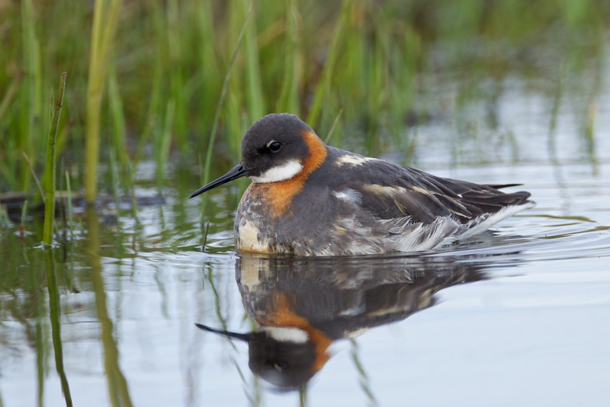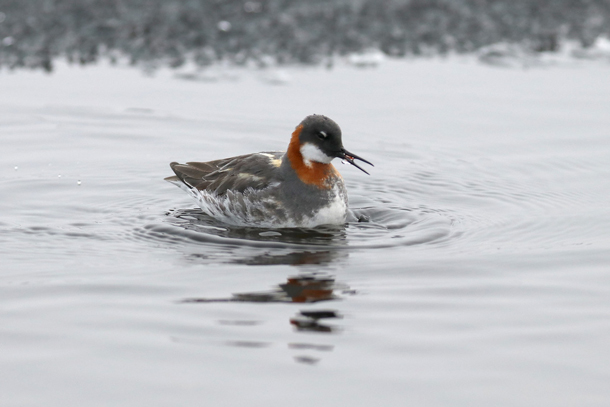BirdNote®: Red-Necked Phalaropes, Spinners On The Sea
Air Date: Week of October 25, 2019

You’re most likely to spot a red-necked phalarope on a shallow arctic lake. (Photo: Gregg Thompson)
Some birds catch their food on the wing, snatching insects out of the air or plunging for fish in water. Others peck at trees or the ground to find grubs and worms but as BirdNote’s Michael Stein reports, an Arctic bird called the red-necked phalarope has a more unusual way to collect its dinner.
Transcript
DOERING: Some birds catch their food on the wing, snatching insects out of the air or plunging for fish in the water. Others peck at trees or the ground to find grubs and worms but as BirdNote’s Michael Stein reports, one Arctic bird has a more unusual way to collect its dinner.
BirdNote®
Red-necked Phalaropes, Spinners on the Sea
[Calls of Red-necked Phalaropes and sound of wind on the ocean]
Red-necked Phalaropes are sandpipers that make their living from the sea. They breed on the arctic tundra but then migrate to the open ocean, where they’ll stay through the winter, feeding on tiny crustaceans and other marine animals.
You’ll be lucky to ever see one of these little birds, but if you do it’ll probably be on a shallow arctic lake. Stay and watch for a bit and you may see the phalaropes’ wonderfully unique method of feeding.
The birds twirl on the surface like little ballerinas, spinning and pecking, again and again.
[Calls of Red-necked Phalaropes]

Red-necked phalaropes breed on the Arctic tundra, then migrate to the open ocean to live there through the winter. (Photo: USFWS)
As it spins, the phalarope forces water away from the surface, causing an upward flow from as deep as a foot below. And with this flow comes food. Little animals, like tiny fly larvae, are forced to the surface. Then the phalarope quickly opens its bill, creating another rapid movement that pulls its prey into the back of its mouth.
One of the rewards of observing birds closely is that you see the fascinating strategies they use to survive and thrive.
[Calls of Red-necked Phalaropes]
###
Written by Dennis Paulson
Producer: John Kessler
Managing Producer: Jason Saul
Editor: Ashley Ahearn
Associate Producer: Ellen Blackstone
Assistant Producer: Mark Bramhill
Narrator: Michael Stein
Bird sounds provided by The Macaulay Library at the Cornell Lab of Ornithology, Ithaca, New York. Recorded by G. Vyn. Ambient sound by Kessler Productions.
BirdNote’s theme music was composed and played by Nancy Rumbel and John Kessler.
© 2019 Tune In to Nature.org September 2012 / 2015 / 2019
https://www.birdnote.org/show/red-necked-phalaropes-spinners-sea
DOERING: For pictures, spin on over to our website, loe dot org.
Links
This story on the BirdNote® website
Living on Earth wants to hear from you!
Living on Earth
62 Calef Highway, Suite 212
Lee, NH 03861
Telephone: 617-287-4121
E-mail: comments@loe.org
Newsletter [Click here]
Donate to Living on Earth!
Living on Earth is an independent media program and relies entirely on contributions from listeners and institutions supporting public service. Please donate now to preserve an independent environmental voice.
NewsletterLiving on Earth offers a weekly delivery of the show's rundown to your mailbox. Sign up for our newsletter today!
 Sailors For The Sea: Be the change you want to sea.
Sailors For The Sea: Be the change you want to sea.
 The Grantham Foundation for the Protection of the Environment: Committed to protecting and improving the health of the global environment.
The Grantham Foundation for the Protection of the Environment: Committed to protecting and improving the health of the global environment.
 Contribute to Living on Earth and receive, as our gift to you, an archival print of one of Mark Seth Lender's extraordinary wildlife photographs. Follow the link to see Mark's current collection of photographs.
Contribute to Living on Earth and receive, as our gift to you, an archival print of one of Mark Seth Lender's extraordinary wildlife photographs. Follow the link to see Mark's current collection of photographs.
 Buy a signed copy of Mark Seth Lender's book Smeagull the Seagull & support Living on Earth
Buy a signed copy of Mark Seth Lender's book Smeagull the Seagull & support Living on Earth

